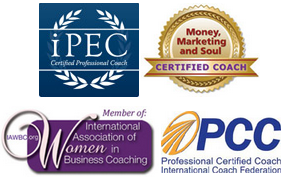Should you Offer a Coaching Guarantee?
 Whether or not you should offer a guarantee is a great question, and even among the most successful coaches, opinions differ. Ultimately, it’s a question only you can answer. What I will do here is give you the pros, the cons, and the details, so you can make an informed decision.
Whether or not you should offer a guarantee is a great question, and even among the most successful coaches, opinions differ. Ultimately, it’s a question only you can answer. What I will do here is give you the pros, the cons, and the details, so you can make an informed decision.
There are different types of guarantees. In coaching, a “value” or “satisfaction” type of guarantee is usually the most appropriate. Essentially this means “I guarantee you’ll be completely satisfied with this program or . . .”
If you’re offering a group program, such as a teleseminar series or workshop, or a home study program, there’s really no downside to offering a guarantee.
You’re still putting the same amount of time into creating or delivering the program, so it’s well worth your while to offer to refund the buyer’s money if they aren’t satisfied. It helps people feel more comfortable investing, and you’ll close a lot more sales.
Your private coaching is where it gets a bit dicey. Here’s why: Coaching results are largely dependent on the client doing the work. We can do a fabulous job and coach our hearts out, but it’s still up to them to create the result.
So, if you offer a satisfaction guarantee, and your client doesn’t do the work, and therefore isn’t satisfied, he or she could justifiably ask for a refund. Even if you’ve done a wonderful job of coaching, you’ll still be stuck not being paid for your efforts.
This is why many coaches do not offer a guarantee on their private coaching.
On the other hand, if you want to enroll a potential client who doesn’t know you, or wasn’t a referral by someone they trusted, you’ll be speaking with someone who hasn’t developed a high “trust factor” with you yet.
A guarantee just might sway them over to taking that leap of trust and hiring you. I can attest to the success of this strategy.
Although I no longer offer a guarantee on my private programs, I did offer one for ten years in my days as a Life Coach. I’ve lost count of how many clients I signed up because they were comforted by my guarantee, but it was a significant percentage of my clients.
And not once did anyone ever ask for a refund. Never. Surprised? Don’t be. If you’re good at what you do (and I know you are, or you wouldn’t be reading this right now), people will rarely ask for a refund, especially if you use the strategies I’ve outlined below.
However, give it some thought, because it is a risk, and should you choose this route, you need to be ready for it if someone does take you up on your “satisfaction guarantee”.
Here are 5 important strategies to use when offering a guarantee in a private or a group coaching contract:
- Limit the amount of time they have to exercise the guarantee. For example, if it’s a 6 month or month-to-month coaching program, give them up to 30 days once the program begins, no more. If it’s a 5 session teleseminar, give them up to the end of the first or second session.
- As part of the agreement, stipulate that the client must make an effort to resolve any situation they feel is unsatisfactory, giving you advance notice of their dissatisfaction, and making an effort to work together with you to correct the situation.
- Create specific milestones during the program to take your client’s “satisfaction temperature,” and be on the lookout for any clues that a client may not be happy. Find out what it will take for them to be more than satisfied, and take care of their issues immediately.
- Clarify the difference between an issue with you, and an issue that’s really more about them. Be courageous and tactfully coach them appropriately if it’s really an issue about them. I’ve had clients experience significant “aha” moments when I’ve done this.
- If they do insist on a refund, be gracious. Avoid being defensive or blaming the client. Be perfectly willing to honor your guarantee. Maintain the attitude that you want them to be happy, no matter what. Ask them for feedback that will help you create a more positive experience for others in the future.








Leave a Reply